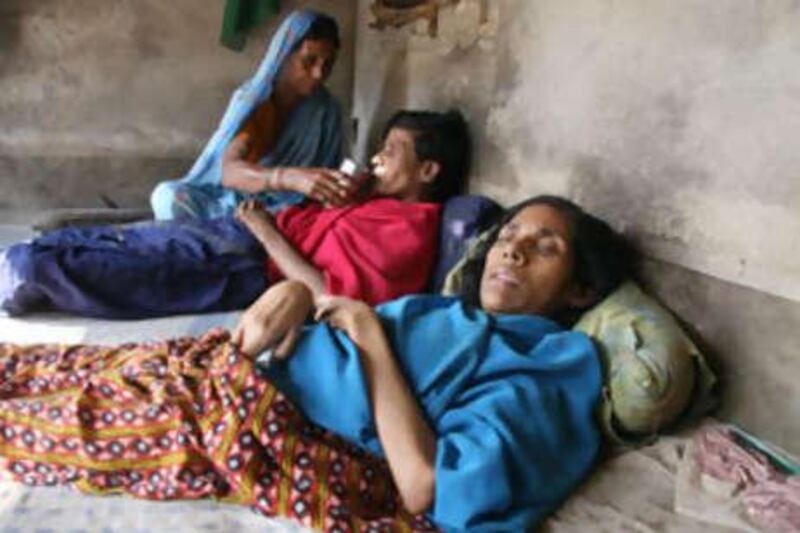MULUK, INDIA // A father of two middle-aged daughters who are physically disabled wrote a letter to the president of India yesterday asking to euthanise them, citing his inability to look after them and the absence of enough government support. Abdur Rauf, 71, from the West Bengal town of Muluk, 200km north of Kolkata, has been out of work for five years because of poor eyesight and leg injuries. He worries for the well-being of his daughters - both of whom support his petition - after he and his 67-year-old wife die. He has resorted to begging to try and support his wife and the two daughters, who have been bedridden since birth. "I am an old and handicapped man," the letter to Pratibha Patil, the president, reads. "By begging I cannot make ends meet. Government relief does not meet even one fourth of our need. Fatema and Rezina are my daughters, and I love them. So, I don't want them to remain alive and go through more pain and sufferings. Their miseries will increase many times after we, their parents, die. Please order their [mercy] killing or, at least let me kill them. "Begging is shameful - even my handicapped daughters say so. With my disabled legs I cannot run around seeking aid from government offices any more. Please let me poison my handicapped daughters before we commit suicide, if you cannot arrange to kill them." Since birth, Fatema, 40, and Rezina, 36, have been bedridden as they have limited use of their muscles, the result of paralysis doctors said was caused by meningitis. "When I was a bus driver I earned enough and we never had problems for food and clothing for my family. I could easily meet my daughters' medical expenses then," Mr Rauf said at the family's home in Muluk. "But as soon as I lost my driver's job, with no one else in the family earning, I have been living on charity from others." Lying on her bed, Rezina shook her head left and right but failed to shoo away flies crawling over her running nose. Unable to move her limbs, she cried out for her mother's help. Their mother, Ansara Bibi, who was outside preparing food, came running in to her daughters and wiped their faces with a wet cloth. This has been her routine for four decades. "I need to take care of them the way a mother takes care of newborns. I bathe them, feed them and even help them when nature calls. They cannot move any of their limbs and always lie in bed. They cannot spend half an hour without my help," said Ms Bibi, placing a crumb of bread with sugar in Fatema's mouth. "I always worry as to who will take care of them this way after I die." Recently, when officials from a non-governmental organisation willing to adopt Fatema and Rezina visited Muluk, the two began wailing and refused to leave their parents. "Nobody can love and take care of me the way my mother can," Rezina said. "For the last three years, since I learnt how to [pray while] lying in bed, I have been praying to Allah to take me away from the earth before my parents leave." Her sister, Fatema, also prays for an end to their misery. "For 40 years lying on this bed I have seen women of my age getting married and having beautiful families. I have been denied such a happy life. I told my father many times to bring poison for me. Nobody is helping me to kill myself." In 2005, Mr Rauf made the first appeal for the euthanasia of his daughters to the chief minister of West Bengal state. Euthanasia is illegal in India and his appeal was turned down. But, for Fatema, the state government offered 500 rupees (Dh36.5) and 12 kilograms of rice every month as a disability pension. "It's too small a relief when I need at least 1,000 rupees [a month] only for the medicine for my two daughters," Mr Rauf said. Village council officials agree that the relief that Mr Rauf's family is getting is "truly inadequate". "We have helped them to some extent and we are trying our best so that Rezina also gets the disability pension of 500 rupees a month. In a special project soon, the two girls will begin receiving free midday meals," said Prashanta Banerjee, the secretary of the local village council. "However, we accept that this relief will not really help them that much - the family has been flooded with miseries." "Whatever the government gives, it will never be really enough for Mr Rauf's family." Mr Rauf said the situation as it stands is untenable and only one solution remained. "Begging is extremely humiliating for all of us, including my daughters - who cried for days when they discovered I was begging for them. "The best solution is that they should not be allowed to live any longer." aziz@thenational.ae
Father in India makes plea for the unthinkable
A father of two middle-aged daughters who are physically disabled wrote a letter to the president asking to euthanise them.

Editor's picks
More from the national




